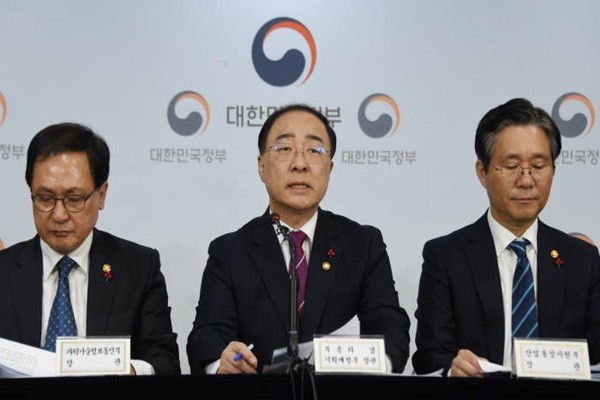South Korean Government is going to set up ‘ICT (Information Communication Technology) fund’ worth $1.06 billion (1.2 trillion KRW) to vest into small and medium ICT companies. It is also going to push for investment project worth $10.6 billion (12 trillion KRW) + α such as construction of Hyundai Motor Group’s new company building and start investing into slumping companies.
South Korea’s economic policy focuses on ‘economic boom’ rather than ‘income-led growth’. South Korean Government changed the direction of its economic policy after considering severe situations such as low growth rate. Income-led growth policies will reorganize determinants of minimum wage and extend flexible work system by end of February to supplement any side effect.
South Korean Government held an expanded meeting with ministers of various ministries with President Moon Jae-in as the presider at the Blue House on the 17th and finalized on ‘2019 economic policy direction’.
As the primary task, South Korean Government is going to focus on vitality of South Korea’s economy rather than income-led growth after considering difficult states its economy is in such as growth rate of 2018 and 2019 being between 2.6 and 2.7% and current account for 2019 being reduced to $64 billion due to slow increase trend of exports.
Considering recent trend of investments being slowed down, South Korean Government is going to devote all of its efforts to vitalize ‘corporate investment’. It is going to set up ‘ICT fund’ worth $1.06 billion (1.2 trillion KRW) and invest into small and medium ICT companies. KOREA POST and private and institutional investors will invest $354 million (400 billion KRW) and $707 million (800 billion KRW) respectively.
South Korean Government is going to push for early large-scale corporate investments that are currently stuck due to mediation of interests. It is going to support 4 projects that are worth $5.3 billion (6 trillion KRW) + α such as Hyundai Motor Group’s Global Business Center ($3.27 billion (3.7 trillion KRW)). Large-scale public investment projects that exempt preliminary feasibility study will be determined by end of March.

To respond to possible risks from downward trends of economy and employment, South Korean Government is going to use 61% of 2019 budget ($415 billion (470 trillion KRW)) during the first half of 2019. This will be the highest percentage ever in South Korea’s history. It is going to strengthen its exportation and overseas expansion by operating ‘Global Plant, Construction, Smart City Financial Support Program’ worth $5.3 billion (6 trillion KRW). To promote consumption, it is going to reduce individual consumption tax for cars (5% to 3.5%), which was expected to stop at the end of this year, until June.
South Korean Government has put out economic boom as the main focus rather than previous economic policy directions that were announced three times. It is basically saying that it will continue its income-led growth policies within a larger scheme while focusing on making meaningful performance by promoting corporate investments and others. It emphasized that it will make meaningful results by end of the first half of 2019 by selecting 16 major projects.
South Korean Government’s income-led growth policies will focus on supplementing side-effects. It is going to announce solutions for easing financial burden of small businesses from increase in minimum wage by end of this month. To control speed of minimum wage increase, it will prepare a revised proposal of minimum wage in January and finish revising relevant laws in February after discussing them within the National Assembly. Another goal is to finalize flexible work system by end of February.
“It is important to push for new economic policies such as minimum wage increase and reduced work hours after considering situations of people involved and economic and social acceptability.” said President Moon. “We will also consider taking additional measures if necessary.”
However, it was difficult to notice innovative measures that are differentiated from current economic policies. Some are concerned that it will be difficult to make meaningful results for tasks that are entangled with many interests within 6 months.
“I hope that economy-related departments will do their best with a mindset of making meaningful results for at least 16 major projects.” said President Moon. “We are currently changing foundation for our economic policies. There can be controversies and doubts while we are working on these projects and it is important for us to be patient and focus on making meaningful results.”
Staff Reporter Yoo, Seonil | ysi@etnews.com & Staff Reporter Sung, Hyeonhee | sunghh@etnews.com